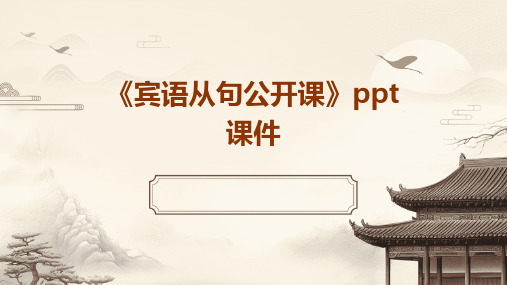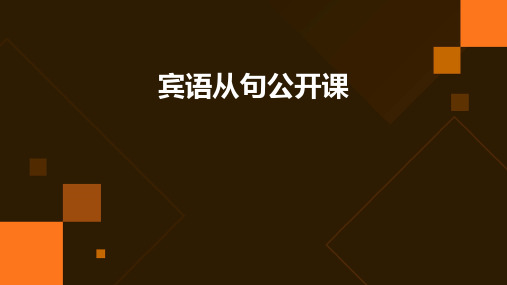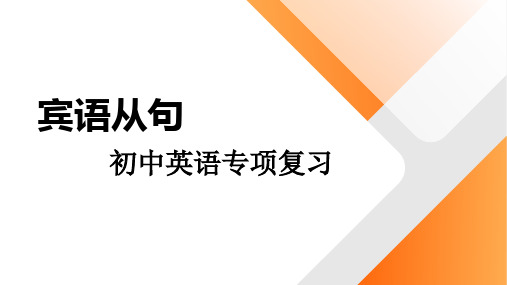初中英语宾语从句复习课件(公开课)
合集下载
初中宾语从句完整ppt课件

初中宾语从句完整ppt课件
目 录
• 宾语从句基本概念与结构 • 宾语从句时态与语态 • 宾语从句连接词选择及用法 • 宾语从句语序调整技巧 • 宾语从句中虚拟语气应用 • 宾语从句常见错误及纠正方法
01 宾语从句基本概 念与结构
定义及作用
定义
宾语从句是一个句子作为宾语, 通常放在动词、介词或形容词后 面,用来补充说明主句的内容。
作用
使句子表达更加完整、具体,增 强语言的丰富性和准确性。
结构组成
01
02
03
主句
包含主谓结构,表达主要 意思的句子。
引导词
引导宾语从句的词,如 that、whether、if等。
从句
作为宾语的句子,具有完 整的句子结构,包括主语 和谓语。
常见引导词
that
引导陈述句作为宾语从句 ,无词义,可省略。
例题3
The teacher told us that the sun _______ (rise) in the east.
解析
此题考查宾语从句的时态呼应和客观真理。主句为一般过 去时,但从句所叙述的是客观真理或事实,因此应该用一 般现在时。即rises。
03 宾语从句连接词 选择及用法
连接词分类及功能
典型例题解析
例题1
我希望我能够穿越时空回到过去。
解析
此句表达了一个与现在事实相反的假设,因此使用虚拟语 气。正确的表达应该是“I wish I could travel through time and go back to the past.”
例题2
他后悔没有早点开始学习外语。
解析
此句表达了一个与过去事实相反的假设,因此使用虚拟语 气。正确的表达应该是“He regrets not having started learning a foreign language earlier.”
目 录
• 宾语从句基本概念与结构 • 宾语从句时态与语态 • 宾语从句连接词选择及用法 • 宾语从句语序调整技巧 • 宾语从句中虚拟语气应用 • 宾语从句常见错误及纠正方法
01 宾语从句基本概 念与结构
定义及作用
定义
宾语从句是一个句子作为宾语, 通常放在动词、介词或形容词后 面,用来补充说明主句的内容。
作用
使句子表达更加完整、具体,增 强语言的丰富性和准确性。
结构组成
01
02
03
主句
包含主谓结构,表达主要 意思的句子。
引导词
引导宾语从句的词,如 that、whether、if等。
从句
作为宾语的句子,具有完 整的句子结构,包括主语 和谓语。
常见引导词
that
引导陈述句作为宾语从句 ,无词义,可省略。
例题3
The teacher told us that the sun _______ (rise) in the east.
解析
此题考查宾语从句的时态呼应和客观真理。主句为一般过 去时,但从句所叙述的是客观真理或事实,因此应该用一 般现在时。即rises。
03 宾语从句连接词 选择及用法
连接词分类及功能
典型例题解析
例题1
我希望我能够穿越时空回到过去。
解析
此句表达了一个与现在事实相反的假设,因此使用虚拟语 气。正确的表达应该是“I wish I could travel through time and go back to the past.”
例题2
他后悔没有早点开始学习外语。
解析
此句表达了一个与过去事实相反的假设,因此使用虚拟语 气。正确的表达应该是“He regrets not having started learning a foreign language earlier.”
宾语从句复习公开课课件(共32张PPT)

2.当主句是一般过去时的时候,宾语从句必须运用相 应的过去的某一种时态。
宾语从句中时态的变化
He told me (that) Summer is after Spring . I was told (that) the sun is much bigger than the moon. My parents told me (that) no news is good news.
•5. Do you know _____ A they listened to yesterday ?
B .when C. why D. how
Find out the rules. I don’t know where I should go.
①
I don’t know where to go Tell me how I can do it.
1. He asked me why was I late for school.
I was
注意语序。宾语从句的语序必须是陈述语序。 即先主语后谓语
2. He doesn’t know that when he can come back.
去掉that 宾语从句中不能同时用两个连接词
3.Lily said she didn’t know how much did the computer cost.
宾语从句的语序
将下列问句变成陈述句。 1. Can he swim ? → He can swim . 2. Does he have a pen ? → He has a pen . 3. Which place did he go to ? →Which place he went to .
将上面的句子置于一个主句后,变成一个宾语从句。 e.g. Can you tell me if/whether he can swim? Can you tell me if/whether he has a pen? Can you tell me which place he went to?
中考英语语法专题-宾语从句课件【71张PPT】全文

【答案】B 【解析】句意:打扰一下,你能告诉我去广播站怎么走吗?-当然。 沿着这条街走,你会在右边找到它。结合答语 可推知,此处指询问怎样去某地,故用表示how;又因为空格处内容在此作tell的宾语从句,宾语从句需要用陈序语 序。故选 B。
宾语从句的语序
2. —Simon, you look smart in the T-shirt. Could you tell me _______ it?
例如: He said the moon goes around the earth.
他说月亮绕着地球转。
宾语从句的时态
例题1:改错练习 1) She said that she is a student. 2) She said that she will fly to Japan in a week. 3) She said that she has finished her homework already. 4) He told me that Japan was an island country. 5) He tells me that his sister comes back yesterday.
ห้องสมุดไป่ตู้
些引导词有各自的意思,在从句中要作相应的成分,不能省略。例如:
Could you tell me which gate we have to go to?
请问我们得走哪个门?
He didn’t tell me how long he would stay here.
他没有告诉我他要在这里呆多长时间。
宾语从句的时态
宾语从句的时态,只要记住以下口诀即可: "主现则从任,主过则从过,客观真理一般现"
宾语从句的语序
2. —Simon, you look smart in the T-shirt. Could you tell me _______ it?
例如: He said the moon goes around the earth.
他说月亮绕着地球转。
宾语从句的时态
例题1:改错练习 1) She said that she is a student. 2) She said that she will fly to Japan in a week. 3) She said that she has finished her homework already. 4) He told me that Japan was an island country. 5) He tells me that his sister comes back yesterday.
ห้องสมุดไป่ตู้
些引导词有各自的意思,在从句中要作相应的成分,不能省略。例如:
Could you tell me which gate we have to go to?
请问我们得走哪个门?
He didn’t tell me how long he would stay here.
他没有告诉我他要在这里呆多长时间。
宾语从句的时态
宾语从句的时态,只要记住以下口诀即可: "主现则从任,主过则从过,客观真理一般现"
初中宾语从句省公开课获奖课件市赛课比赛一等奖课件

简朴句
主s 谓v 宾o
We know he likes English. 复合句
主s
主s 谓v
谓v
宾o
宾o
宾语从句就是由一种句子来构成主句旳宾语
二 .宾语从句旳引导词
1. that
E.g.: 1) I hear (that) he will be back in an hour. 2) He said (that) he wanted to stay at home.
not. Tell me whether you’d like to go shopping or tidy the
room. 4.宾语从句提前时: Whether this is true or not, I can’t say.
5.在动词discuss后旳宾语从句中: E.g.: We discussed whether we would have a sports
A. when you did it so well B. when did you do it so well C. how you did it so well D. how did you do it so well
(2023重庆)-------Could you tell me______? -------By searching the Internet.
Object Clauses
宾语从句
一.教学任务 宾语从句 二.教学要点
1.宾语从句旳概念
2.宾语从句旳引导词 3.宾语从句中旳语序 4.宾语从句旳时态变化
三.教学难点 1. when与if 引导旳宾语从句和状语从句 2.宾语从句与简朴句旳互换
一 什么 是宾语从句?
《宾语从句公开课》课件

疑问句语序
宾语从句如果是疑问句, 其语序通常是疑问词+助 动词+主语+谓语+其他成 分。
倒装语序
在某些特定语境下,宾语 从句可能会使用倒装语序 ,以强调某些信息或表达 特定的情感。
时态与语序的综合运用
时态与语序的关联
练习与运用
在英语中,时态和语序是相互关联的 ,不同的时态和语序可以表达不同的 意思和情感。
通过练习和运用,学生可以更好地掌 握时态和语序的使用,提高英语口语 和写作能力。
语境对时态和语序的影响
在不同的语境下,时态和语序的使用 可能会有所不同,需要根据具体的语 境进行选择。
04
CATALOGUE
宾语从句的注意事项
主句与从句的逻辑关系
宾语从句必须与主句 逻辑关系紧密相连, 不能出现逻辑断裂。
02
CATALOGUE
宾语从句的用法
陈述句做宾语从句
总结词
宾语从句可以用陈述句来表达,陈述 句用来描述事实或观点。
详细描述
在英语中,当一个句子作为宾语使用 时,它必须是一个陈述句,而不是疑 问句或感叹句。陈述句用来传达信息 ,说明事实或表达观点。
一般疑问句做宾语从句
总结词
一般疑问句也可以作为宾语从句,但需要调整语序。
宾语从句的分类
简单句型中的宾语从句、复合 句型中的宾语从句、双宾语从 句。
宾语从句的引导词
that、if、whether、what、 who、which、how等。
宾语从句的时态
主句和从句的时态要一致,遵 循“主将从现”的原则。
下节课预告
重点讲解
定语从句的定义、分类和用法。
实践练习
通过例句和练习题,加深对定语从句的理解和应 用。
初中英语宾语从句专项复习课件(19张PPT)

二 .宾语从句的引导词
1)Do you know whose book it is (这是谁的书) ? 2)Could you tell me why the train is late(火车为什
么迟到)?
3)He asked us when we left (我们什么时候离开 ).
2.特殊疑问句作宾语从句, 由 特殊疑问词 充当引导词 来连接主从句。由连接代词who,whom,whose,which,what
→
Which is the way to the station.
想一想 为什么4,5,6 语序不变?
练一练
A. What is he doinHge? asked me__w__h_a_t_h_e__w_a_s_d_o_i_n_g_._ B. Where does Jim go? Everyone wants to know __w_h_e_r_e_J_i_m__g_o_e_s. C.Who is he waiting for? Could you tell me who he is waiting for。? D. Who is waiting for her? Please tell me w__h_o_i_s_w__a_it_in_g__f_o_r_h_e_r_. __
DW W W Wohhhheieaacsttrh'ehshiedawspihrdtpohaheenvneegwegawadoypittehtoton?yyt?o→ohuu→e ??st→→atWiohHne?eWrWehhhahaaaestpt'sehwnwa.epr.noptnegnewdithtoyy.oo.uu
Jim was playing( play ) basketball at nine
宾语从句详解公开课PPT课件

doctor.
if/whether的用法
01
02
03
概述
功能
常见句型
if/whether用于引导表示条件的宾语从句 。
if/whether表示主句中的动作发生的前提 条件。
I wonder (if/whether) she will accept the invitation.
who/what/which/how等的用法
04
宾语从句的简化
用不定式或动名词来简化
01
02
总结词:转换方式
详细描述:在句子中,如果宾语从句的内容是表示一个具体的行为或 动作,可以将宾语从句转换为不定式或动名词形式,使句子结构更加 简洁。
用it来简化结构
总பைடு நூலகம்词:使用技巧
详细描述:通过使用代词“it”来代替真正的主语或宾语,可以有效地简化宾语 从句的结构,使句子更加易于理解和表达。
陈述句作宾语从句
特殊疑问句作宾语从句
使用陈述句作宾语从句时,语序通常 与陈述句相同,即主语+谓语+宾语。
使用特殊疑问句作宾语从句时,通常 需要将疑问词提前,并将语序调整为 陈述句语序,即主语+谓语+宾语。
一般疑问句作宾语从句
将一般疑问句作宾语从句时,通常需 要将疑问词提前,并将语序调整为陈 述句语序,即主语+谓语+宾语。
01
02
03
概述
who/what/which/how 等用于引导特殊类型的宾 语从句。
功能
这些引导词在宾语从句中 充当成分,具体取决于从 句的内容。
常见句型
I don't know (who) he is. / They discussed (what) they should do next.
if/whether的用法
01
02
03
概述
功能
常见句型
if/whether用于引导表示条件的宾语从句 。
if/whether表示主句中的动作发生的前提 条件。
I wonder (if/whether) she will accept the invitation.
who/what/which/how等的用法
04
宾语从句的简化
用不定式或动名词来简化
01
02
总结词:转换方式
详细描述:在句子中,如果宾语从句的内容是表示一个具体的行为或 动作,可以将宾语从句转换为不定式或动名词形式,使句子结构更加 简洁。
用it来简化结构
总பைடு நூலகம்词:使用技巧
详细描述:通过使用代词“it”来代替真正的主语或宾语,可以有效地简化宾语 从句的结构,使句子更加易于理解和表达。
陈述句作宾语从句
特殊疑问句作宾语从句
使用陈述句作宾语从句时,语序通常 与陈述句相同,即主语+谓语+宾语。
使用特殊疑问句作宾语从句时,通常 需要将疑问词提前,并将语序调整为 陈述句语序,即主语+谓语+宾语。
一般疑问句作宾语从句
将一般疑问句作宾语从句时,通常需 要将疑问词提前,并将语序调整为陈 述句语序,即主语+谓语+宾语。
01
02
03
概述
who/what/which/how 等用于引导特殊类型的宾 语从句。
功能
这些引导词在宾语从句中 充当成分,具体取决于从 句的内容。
常见句型
I don't know (who) he is. / They discussed (what) they should do next.
中考英语总复习之宾语从句专题课件(共48张PPT).ppt

A. how soon will he be back B. how soon he will be back C. how long will he be away D. how long he will be away
真题演练
10. I don't know _________ . A. what time the movie starts B. what time starts the movie C. the time to start the movie D. the movie what time starts
备注
主句 现在某种时态
从句 根据实际情况而定
随堂练习
1. 时态 (主现从任)
? He asks me if I ____ (see) his brother yesterday. ? My father tells me that he _____ (fly) to Qingdao for
a holiday. ? He wonder what I _____ (do) at five yesterday
真题演练
7. --Do you know ________ next Friday, Lily? --If it doesn't rain, we will .
A. if we will take a field trip B. will we take a field trip C. why we will take a field trip
真题演练
13. --Would you like to tell me ______? --Sure, practice makes perfect.
afternoon.
真题演练
10. I don't know _________ . A. what time the movie starts B. what time starts the movie C. the time to start the movie D. the movie what time starts
备注
主句 现在某种时态
从句 根据实际情况而定
随堂练习
1. 时态 (主现从任)
? He asks me if I ____ (see) his brother yesterday. ? My father tells me that he _____ (fly) to Qingdao for
a holiday. ? He wonder what I _____ (do) at five yesterday
真题演练
7. --Do you know ________ next Friday, Lily? --If it doesn't rain, we will .
A. if we will take a field trip B. will we take a field trip C. why we will take a field trip
真题演练
13. --Would you like to tell me ______? --Sure, practice makes perfect.
afternoon.
中考宾语从句详细复习课件 (共17张PPT)

D. rain
e.g. Judy’s mum wondered whether/if she could possibly improve her English.
注意:只能用 1. 在引导主语从句、表语从句时如: whether不能用 2. 用在动词不定式之前时用whether不用if。
if 的情况 3.当与or not连用,或 or 提出两种选择时:
A. that
B. if
C. where
D. what time
小试牛刀
D ● ( )4. Someone is ringing the doorbell . Go and see _______ .
A. who is he
B. who he is
C. who is it
Байду номын сангаас
D. who it is
B ● ( )5. Could you tell me how long __________ ?
who
where
how
语序:陈述句语序(主语+谓语)
Do you know who he is? Could you tell me if there was a hospital?
宾语从句
陈述语序,句子结构: 主语+(系动词、情态动词、助动词)+谓语/形容词
时态
●1、主句用现在时或将来时,从句可用任何时态,根据实际情况 而定。(主现从任意)
.4. 在介词或dicuss后面:
5. 与动词不定式连用(whether to do sth.)
即时训练
●Judy says
her mum can’t understand English.
宾语从句(32张PPT)初中英语专项复习课件

知识点一:宾语从句的概说和分类
根据引导宾语从句的不同连词,宾语从句可分为三类: (1) 从句是陈述句:引导词用that 无词义,可省略
结构:主句+that+主语+谓语+其他. He is a teacher. I know that he is a teacher. He doesn’t like English. I think that he doesn’t like English.
知识点二:宾语从句的引导词
在主句为动词be加某些形容词(如sorry, sure, afraid, glad等)作表语时,后面所跟的省略that的从句也可算是 宾语从句
❖I’m sorry (that) I don’t know . ❖We’re sure (that) our team will win . ❖I’m afraid (that) he won’t pass the exam .
稿定PPT
稿定PPT,海量素材持续更 新,上千款模板选择总有一 款适合你
知识点二:宾语从句的引导词
1.从句是陈述句:that
2.从句有是否的意思:whether, if
3.从句是特殊疑问句:
在从句里 充当:主 语,宾语, 表语,状 语
什么:what 谁:who 谁的: whose 哪一个:which
主句
宾语从句
Do you know
how old Liz is? 你知道兹几岁吗?
I know
how old Liz is. 我知道莉兹几岁。
I don’ t know
how old Liz is. 我不知道莉兹几岁。
宾语从句"how old Liz is"是主句动词know的宾语。how在从句中作副词。 注意从句的顺序,主语在动词前(Liz is)。
九年级宾语从句复习课件

认为他不是医生。)
主句与从句时态不一致
总结词
主句与从句时态不一致是指在宾语从句中,主句和从 句的时态不匹配,导致句子意思表达不准确。
详细描述
在宾语从句中,时态应该与主句保持一致。如果主句 是现在时态,从句也应该使用现在时态;如果主句是 过去时态,从句也应该使用过去时态。如果时态不一 致,就会造成句子意思表达不准确。例如,“He said that he will be leaving for New York next week.”(他说他下周要去纽约。)在这个句子中, 主句是过去时态,而从句是将来时态,造成了时态不 一致。
05
宾语从句的练习与解析
基础练习题
01
02
03
04
总结词:巩固基础
练习一:选择题,识别句
练习三:改错题,纠正宾语从 句错误
进阶练习题
01
总结词
提高应用能力
02
03
04
练习一
翻译题,将中文句子翻译成英 文,注意宾语从句的正确使用
练习二
情境对话,根据对话内容,补 充适当的宾语从句
练习三
写作题,写一篇短文,运用所 学宾语从句知识进行表达
高阶练习题
总结词
挑战与拓展
练习一
分析题,分析复杂句子结构, 找出其中的宾语从句
练习二
推理题,根据前文信息,推断 出宾语从句的内容
练习三
自由表达,根据给定话题,自 行创作一篇短文,充分运用宾
语从句进行表达
THANKS
感谢观看
否定前移
总结词
否定前移是指在宾语从句中,主句的否定词不直接放在从句的谓语动词之前,而是放在 句首,导致整个句子的意思发生变化。
详细描述
主句与从句时态不一致
总结词
主句与从句时态不一致是指在宾语从句中,主句和从 句的时态不匹配,导致句子意思表达不准确。
详细描述
在宾语从句中,时态应该与主句保持一致。如果主句 是现在时态,从句也应该使用现在时态;如果主句是 过去时态,从句也应该使用过去时态。如果时态不一 致,就会造成句子意思表达不准确。例如,“He said that he will be leaving for New York next week.”(他说他下周要去纽约。)在这个句子中, 主句是过去时态,而从句是将来时态,造成了时态不 一致。
05
宾语从句的练习与解析
基础练习题
01
02
03
04
总结词:巩固基础
练习一:选择题,识别句
练习三:改错题,纠正宾语从 句错误
进阶练习题
01
总结词
提高应用能力
02
03
04
练习一
翻译题,将中文句子翻译成英 文,注意宾语从句的正确使用
练习二
情境对话,根据对话内容,补 充适当的宾语从句
练习三
写作题,写一篇短文,运用所 学宾语从句知识进行表达
高阶练习题
总结词
挑战与拓展
练习一
分析题,分析复杂句子结构, 找出其中的宾语从句
练习二
推理题,根据前文信息,推断 出宾语从句的内容
练习三
自由表达,根据给定话题,自 行创作一篇短文,充分运用宾
语从句进行表达
THANKS
感谢观看
否定前移
总结词
否定前移是指在宾语从句中,主句的否定词不直接放在从句的谓语动词之前,而是放在 句首,导致整个句子的意思发生变化。
详细描述
九年级英语宾语从句专题复习公开课精选课件

Halloween is a fun festival. The girl says that_________________________.
It’s so hot.
it’s so hot. He says that______________________.
Does she like rings?
2. 当宾语从句是一般疑问句时,
由连词whether 或if引导(口语中常用if),译为“是 否”,不能省略。
1.
She asked, “ Do they often come here early? ” She asked if/whether they often came here early.
一般过去时
一般将来时 现在进行时 现在完成时
比一比
He told me (that) Summer is after Spring . I was told (that) the sun is much bigger than the moon. My parents told me (that) no news is good news. 当宾语从句说明的是客观存在的事实或者是客观存在的 真理时,就不用受到主句时态的限制,仍是用一般现在 时态。(特殊性原则)
I hear (that)
1.子的需要使用任何一种时态。 (需要性原则)
辨一辨
1) He will go to Hong Kong . 2) He is sick. 3) He is reading a book . 4) He has finished his work. 1) He would go to Hong Kong . 2) He was sick. 3) He was reading a book . 4) He had finished his work.
宾语从句详解课件(公开课)

Object Clauses 宾语从句
单击此处添加副标题
目录
CONTENTS
01
02
03
04
05
06
什么是宾语?
I know him. Do you have the time? I think (that) she is beautiful. Why don’t you pay attention to me?
1. I want to know . Will he go to the park with us? =________________________________________ ___________________
I want to know if/whether he will go to the park with us.
01
04
02
03
Have you finished reading the book? I wondered.=I wondered if / whether you had finished reading the book.
Did you do your homework last night? I asked.= I asked if / whether you did your homework last night.
He can go with me. He said. =He said he could go with me.
01
时态:如果主句是过去的时态(一般过去时,过去进行时),从句的时态一定要用相对应的过去的某种时态(一般过去时,过去进行时,过去将来时,过去完成时)
02
It is going to rain. I thought. = I thought it was going to rain. 2) He is a worker. He told me.= He told me that he was a worker. 3) They will have a trip. He told me.= He told me that they would have a trip.
单击此处添加副标题
目录
CONTENTS
01
02
03
04
05
06
什么是宾语?
I know him. Do you have the time? I think (that) she is beautiful. Why don’t you pay attention to me?
1. I want to know . Will he go to the park with us? =________________________________________ ___________________
I want to know if/whether he will go to the park with us.
01
04
02
03
Have you finished reading the book? I wondered.=I wondered if / whether you had finished reading the book.
Did you do your homework last night? I asked.= I asked if / whether you did your homework last night.
He can go with me. He said. =He said he could go with me.
01
时态:如果主句是过去的时态(一般过去时,过去进行时),从句的时态一定要用相对应的过去的某种时态(一般过去时,过去进行时,过去将来时,过去完成时)
02
It is going to rain. I thought. = I thought it was going to rain. 2) He is a worker. He told me.= He told me that he was a worker. 3) They will have a trip. He told me.= He told me that they would have a trip.
宾语从句详解公开课PPT课件

注意主从复合句连接词的使用
总结词
正确使用主从复合句的连接词是构建宾语从句的关键。
详细描述
在英语中,主从复合句需要使用适当的连接词来连接主句和从句。常见的连接词包括 that、if、whether、when、where等。例如,“I don't know where he comes from.”(我不知道他来自哪里。)在这个句子中,宾语从句使用了where作为连接词
04
宾语从句的简化问题
可以用不定式、v-ing、that引导的宾语从句
不定式引导的宾语从句 例如,“I decide to ask her if she will come.”(我决定问她是 否会来。)
V-ing引导的宾语从句
例如,“I work.”(我喜欢探究 事物的原理。)
if/whether的用法
01
02
03
定义
if/whether用作引导词, 在宾语从句中表示条件或 疑问。
特点
if常用于表示“如果”, whether常用于表示疑问 或不确定。
例句
I don't know if/whether he will come.
who/what/when/where等词的用法
放在形容词后
宾语从句可以放在形容词之后,用以 进一步描述或限定形容词所修饰的名 词或代词。
VS
在英语句子中,宾语从句还可以放在 形容词之后,用以进一步描述或限定 形容词所修饰的名词或代词。例如, “I know a person who is intelligent and hardworking.”( 我认识一个既聪明又勤奋的人。)这 句话中的“who is intelligent and hardworking”就是一个宾语从句, 放在形容词“intelligent”和 “hardworking”之后,进一步描述 了“我认识的人”的特点。
2024年中考英语语法复习之宾语从句课件(34张PPT)(2024版)

语序篇
无论主句是陈述句还是疑问句,宾语从句都是 运用陈述句的语序,即是“主语在前,谓语在后” 的顺序。
Danny says that he will learn English.
Do you know where he came from?
Please tell me how I can get to the bus station.
主过从必过
当宾语从句说明的是客观存在的事实或者是客观存 在的真理时,就不用受到主句时态的限制,仍是用一般 现在时态。 He told me (that) Summer is after Spring.
We knew (that) the sun is much bigger than the moon .
4. they don’t know ___D___their parents will come or not.
a. that b. what c. if d. whether
5. a.
hi’ollwgitvoesaaytalikt
tomorrow.i’m b. what to say
thin c.
He will go to Hong Kong.
主过从必过
He is sick. He is reading a book.
He has finished his work.
He said
He
to Hong Kong.
He was sick.
He was reading a book.
He had finished his work.
The teacher told us (that) the earth moves around the sun.
宾语从句公开课(课件

总结词
特殊疑问句做宾语从句时,用于表达对特定事物的疑问或关注。
详细描述
特殊疑问句做宾语从句时,通常放在动词或介词之后,形成复合句。例如,“I don't know what time the train will arrive.”(我不知道火车什么时候会到达 。)
选择疑问句做宾语从句
总结词
选择疑问句做宾语从句时,用于表达两种或多种可能性之间的选择。
whether/if
用于一般疑问句,表示是 否的意思,不充当句子成 分。
特殊疑问词
用于特殊疑问句,充当句 子成分,对某一具体内容 进行提问。
02
宾语从句的用法
陈述句做宾语从句
总结词
宾语从句可以用陈述句来表达一个完整的观点或事实。
详细描述
陈述句做宾语从句时,通常放在动词或介词之后,形成一个复合句。例如,“I believe that the sun rises in the east.”(我相信太阳从东方升起。)
一般疑问句做宾语从句
总结词
一般疑问句做宾语从句时,通常用于表达一个疑问或不确定 的观点。
详细描述
一般疑问句做宾语从句时,通常放在动词或介词之后,形成 复合句。例如,“Do you know whether he will come tomorrow?”(你知道他明天是否会来吗?)
特殊疑问句做宾语从句
宾语从句的分类
01
02
03
陈述句作宾语
宾语从句用that引导, that在句子中不充当成分 。
一般疑问句作宾语
宾语从句用whether或if 引导,表示是否的意思。
特殊疑问句作宾语
宾语从句用特殊疑问词引 导,对某一具体内容进行 提问。
特殊疑问句做宾语从句时,用于表达对特定事物的疑问或关注。
详细描述
特殊疑问句做宾语从句时,通常放在动词或介词之后,形成复合句。例如,“I don't know what time the train will arrive.”(我不知道火车什么时候会到达 。)
选择疑问句做宾语从句
总结词
选择疑问句做宾语从句时,用于表达两种或多种可能性之间的选择。
whether/if
用于一般疑问句,表示是 否的意思,不充当句子成 分。
特殊疑问词
用于特殊疑问句,充当句 子成分,对某一具体内容 进行提问。
02
宾语从句的用法
陈述句做宾语从句
总结词
宾语从句可以用陈述句来表达一个完整的观点或事实。
详细描述
陈述句做宾语从句时,通常放在动词或介词之后,形成一个复合句。例如,“I believe that the sun rises in the east.”(我相信太阳从东方升起。)
一般疑问句做宾语从句
总结词
一般疑问句做宾语从句时,通常用于表达一个疑问或不确定 的观点。
详细描述
一般疑问句做宾语从句时,通常放在动词或介词之后,形成 复合句。例如,“Do you know whether he will come tomorrow?”(你知道他明天是否会来吗?)
特殊疑问句做宾语从句
宾语从句的分类
01
02
03
陈述句作宾语
宾语从句用that引导, that在句子中不充当成分 。
一般疑问句作宾语
宾语从句用whether或if 引导,表示是否的意思。
特殊疑问句作宾语
宾语从句用特殊疑问词引 导,对某一具体内容进行 提问。
宾语从句(23张PPT)初中英语专项复习课件

THANK YOU
由从属连词whether, if引导的宾语从句 (2)一般疑问句的引导词用if/whether if/ whether “是否”,说明对陈述的事物不明确或不清楚。 常用在ask, wonder, can(could) you tell me 等后。 e.g.1. I want to know whether/if he is right. 2. I Ask him whether/if he likes me. 3. I wonder whether/if we can get there. 4. Could you tell me whether/if that film is interesting ?
由从属连词 whether, if 引导的宾语从句
由从属连词that引导的宾语从句
(1)陈述句的引导词用that that 在句中无词汇意义,在从句中不能充当成分, 在口语当中往往省略。 e.g.1. I hear (that) you passed the exam. 2. He said (that) his father was a singer. 3. The teacher told us (that) the sun rises in the east.
由从属连词whether, if引导的宾语从句 ◆只能用whether不能用if的情况 1.在介词后面: I’m thinking of whether we should go fishing. We are worried about whether it will rain tomorrow. 2.在动词不定式前: They asked me whether to go skating.
宾语从句之语序 When did he leave?I don’t know. →I don’t know when he left. (3)What’s wrong with…?和What’s the matter?在宾语从句 中语序不变。如: I want to know what’s wrong with you. 我想知道你怎么了。 Could you tell me what’s the matter? 可以告诉我怎么了吗?
- 1、下载文档前请自行甄别文档内容的完整性,平台不提供额外的编辑、内容补充、找答案等附加服务。
- 2、"仅部分预览"的文档,不可在线预览部分如存在完整性等问题,可反馈申请退款(可完整预览的文档不适用该条件!)。
- 3、如文档侵犯您的权益,请联系客服反馈,我们会尽快为您处理(人工客服工作时间:9:00-18:30)。
一般过去时
一般将来时 现在进行时 现在完成时
注意事项
could / would是委婉语气,而不是过去式,因此宾语从
句的时态根据实际情况用不同时态。 1.Could you please tell me where we show our
tickets ?
2.Would you like to know when he will come back ?
考点突破
(C )1(2014天津)—Could you tell me
yuanxiao in China?
—Usually at Lantern Festival. A.when do people eat C.when people eat
( A) 2.—Jack,
B.how do people eat D.how people eat for travelling this summer?
主句
从句
if 如果, 假如
when 当…时
一般将来时态 祈使句 含有情态动词
一般现在时态
if 是否 when 何时,根据句子的需要使用任 何一种时态。不影响句子时态
3.由连接代词 Who,whom,whose,which,what和连 接副词 where,how,why,when引导的宾语从句。这 些连词既有词义又充当句子成份。 e.g. 1)Do you know whose book it is ?(谁的,作定 语) 2)Could you tell me why the train is late? (为 什么,作状语) 3)He asked who could answer the question.(谁, 作主语)
Find out the Object Clauses
3.I don’t know if he will come tonight.
4.Let’s find out what’s on tonight .
5.We are proud of that Beijing is one of the biggest cities in the world .
首页
末页
( )3.
(2014广州)I don’t understand
B
such a silly question in
class yesterday.
A.why did John ask C.why is John asking 4. (2014黄冈)—So, can you tell me
B
B.why John asked D.why John asks here today?
A.that there is a train C.which train can I take
英语
B.when the train leaves D.where does the train go
首页 末页
三.宾语从句中时态的变化
填一填
Jim was ( be ) a worker two years ago. Jim is ( be ) an English teacher now . Jim will cook ( cook ) dinner tomorrow . Jim is singing ( sing )a popular song now. Jim has been ( be ) to the Great Wall twice . Jim was playing ( play ) basketball when his father came back. Jim had learned ( learn )1000 Chinese words by the end of last semester.
什么 是宾语从句?
Байду номын сангаас
试比较
We know him. 简单句 主s 谓v 宾o We know he likes English. 复合句 主s 谓v 宾o 主s 谓v 宾o
宾语从句就是由一个句子来构成主句的宾语
句子结构:主句 + 引导词(连词)+ 宾语从句
1.Our teacher told us that the earth goes around the sun. 2.Please tell me where she has gone.
He says (that) Tom is a good student.
2. 问句——还原为陈述语序 1) be动词、情态动词及助动词(包have/has) 放到从句主语之后;助动词do /does/ did 应删去, 谓语动词根据实际情况而变。
1. Who is Jim waiting for ? I know who Jim is waiting for. 2.Can Lily carry the basket ? I know whether/if Lily can carry the basket. 3. Where did Anna go yesterday? I know where Anna went the day before.
—Well, I was walking down Centre Street when a UFO landed. A.what did you see C.when did you see it B.what you saw D.when you saw
A
(
)5. (2014年临沂) —Dad, can you tell me
to the park?
—The day after tomorrow. A.when we are going C.when are we going
英语
B.when we went D.when did首页 we go
末页
( C )6. (2014河北)I have two tickets for the basketball match.I wonder
中考专项复习
Object Clauses
宾语从句
考 点 分 析
1.宾 语从 句的 引导 词
2.宾 语从 句中 的语 序
3.宾 语从 句的 时态 变化
3.宾 语从 句与 简单 句的 互换
.
教 学 难 点
1. if 与 whet her 的区 别
2when 与if 引 导的宾 语从句 和状语 从句
一
.
A.where you buy the tickets
C.if you’d like to come along ( C )7. (2014达州) —We have no idea —It’s heard that he is Mr.Green’s son. A.where he comes from C.who he is
引导 词
语序 时态
宾语从句三 要素
一、引导词(连词) 1. 当宾语从句是陈述句时(包括肯定句/否定句),
连词由that引导, 因为that在从句中不作任何成分,也没 有任何具体意思,因此在口语或非正式文体中常省略。
1. He said, “life is better than before”. He said (that) life was better than before. 2. He says, “Tom is a good student ”.
could you tell me
— We plan to go and see the beautiful sea in Hainan.
A.where your family will go C.how your family will go B.how will your family go D.where will your family go
与to do 不定式连用只能用whether 4. ____ he will come is not decided.
作主语只能用whether
连词 if 和 when 在不同从句中的区别: C 1). Do you know if ______back next week ? If
he______ back , please let me know . A. he comes , will come B. will he come , comes C. he will come , comes D. he will come , will come 2). I don’t know when hewill _________ come (come) . I comes can’t wait here any more . When he _______ (come) , would you please ask him to call me ?
比一比
He told me (that) Summer is after Spring . I was told (that) the sun is much bigger than the moon. My parents told me (that) no news is good news. 当宾语从句说明的是客观存在的事实或者是客观存在的 真理时,就不用受到主句时态的限制,仍是用一般现在 时态。(特殊性原则)
He said
2.当主句是一般过去时的时候,宾语从句必须运用相 应的过去的某一种时态,从而达到主句和从句的相互 一致。(呼应性原则)
确定从句的时态(根据主句时态)
主句时态
一般现在时 从 句 时 态 连 接 前 连 接 后 时态保持不变 一般现在时 一般过去时 一般过去时 过去完成时 过去将来时 过去进行时 过去完成时
二、语序 宾语从句的语序用陈述语序: 主句+引导词+主语+谓语+其他
